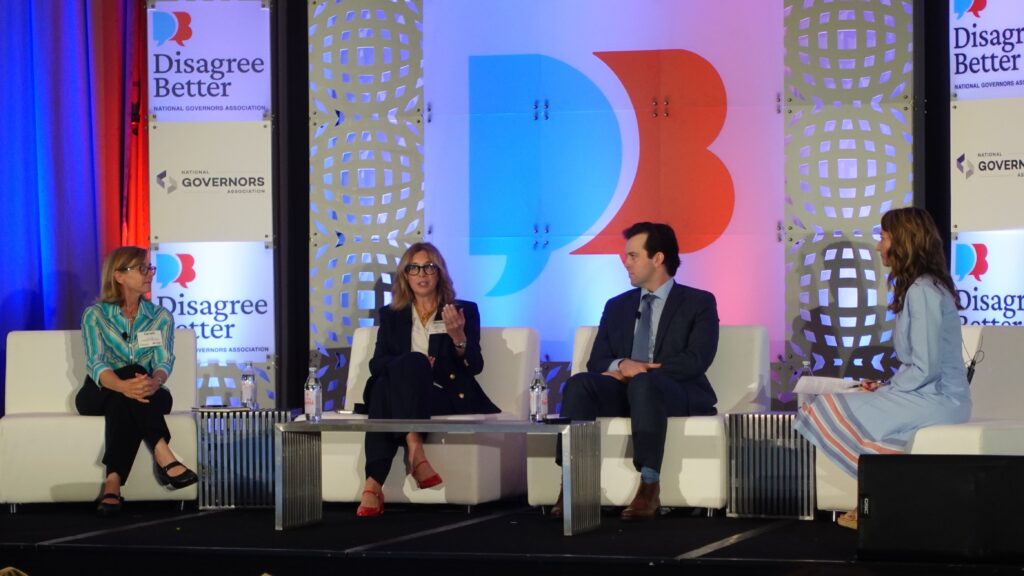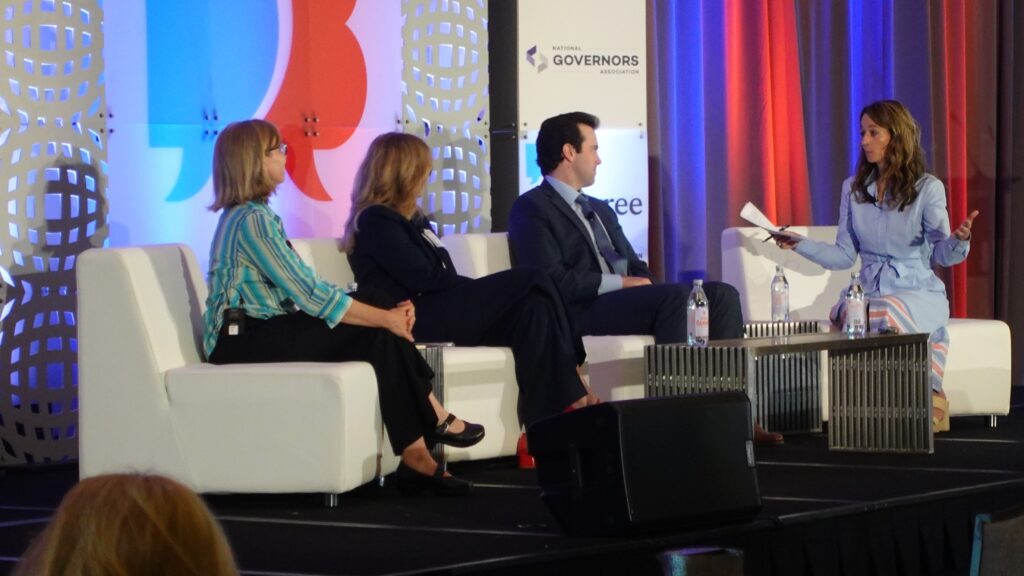On May 14, Tennessee Governor Bill Lee hosted NGA Chair Utah Governor Spencer Cox for a convening in Nashville in support of Governor Cox’s NGA Chair’s Initiative: Disagree Better. Disagree Better is a yearlong initiative launched to help Americans bridge the partisan divide, in part by learning about existing resources designed to help people engage in healthier conversations, especially when disagreeing about political issues.
The Nashville convening centered on the theme of building dialogue skills and fostering positive contact, and the event featured bipartisan experts from across the country, including a panel discussion, moderated by Utah First Lady Abby Cox, on ways to engage with children and students around the Disagree Better principles – including how to have difficult conversations and address polarization. The panel discussion featured:
- Michelle Sobel, President, Unify America;
- Sarah Igo, Dean of Strategic Initiatives, Andrew Jackson Chair in American History, Vanderbilt University; and
- David McCullough III, CEO, American Exchange Project.
First Lady Cox opened the discussion by inviting the panelists to share information about the work they’re leading to help unpack ideas for ways more Americans can work with children and students, especially as they form their identities during the formative years of adolescence and early adulthood, to foster deeper understanding about the commonalities shared between Americans of all ages and backgrounds.

Michelle Sobel led off with an overview about the work she’s helping lead through the nonprofit Unify America, noting, “we’re nonpartisan, and we have a simple goal. We give Americans practice disagreeing better and bridging across this difference and finding common ground in a virtual setting.” The organization focuses largely on utilizing technology to further their work because “it helps connect us across big geographic divides, and it lets us do this at massive scale.”
Sobel’s remarks focused on efforts to engage college students through the Unified Challenge College Bowl, a large-scale intercollegiate program that helps pair students into one-on-one conversations across the ideological spectrum. To date, more than 13,000 students have participated in the United Challenge College Bowl. Of the Spring 2024 College Bowl participants, Sobel shared that 92% of participants said the initiative gave them an opportunity to examine their own point of view, and 73% said the College Bown helped them see a new perspective they hadn’t previously considered, indicating the organization’s work is helping college students find more common ground and more productive ways to speak about potentially polarizing topics.
Mrs. Cox stressed that research continues to echo similar findings, noting a perception gap exists in the country, with studies indicating the majority of Americans really are not that far apart of issues. Mrs. Cox also noted that some of the perception gap, especially for younger Americans, could relate to the impact of the COVID-19 pandemic, especially in terms of isolation and loneliness, sharing, “We have had conversations with our President from the University of Utah, who told me … kids starting college now, or at least when he did this survey a couple of years ago, are coming in with 15,000 fewer social interactions, which he said was equal to about three years. So think about why these kids are struggling, because you’re sending the equivalent of an emotionally mature 15-year-old to college.”

In response to the information Mrs. Cox shared regarding the reduced number of social interactions many college students have compared to cohorts from years prior to the COVID-19 pandemic, Sarah Igo shared insights into work underway at Vanderbilt to help foster connection and bridge political divides. Dr. Igo explained that Vanderbilt is trying to use “a multi-pronged approach to model reasonable, reasoned, though still impassioned, discussions by bringing fellows to campus, to tell students how they came to their ideas about affirmative action, or about abortion, or what have you, and to not just put those people on a stage, but to bring them into small group discussions with students where they really model, changing their mind, how they came to a view, listening to students who don’t, who disagree with them and so forth.” Dr. Igo also explained that they are also working with faculty to train them on having, and not fearing, difficult conversations in class by “giving them a toolkit for how you set norms in classrooms, how you create rules of engagement from the very first moment that allow students to begin to trust that what is said in class won’t be taken outside of class, that people are supposed to stumble and make mistakes and learn from them. That is what education is.”
In addition to working with faculty Vanderbilt is also creating new places where students can go to learn how to argue and disagree better with one another. The university, Dr. Igo noted, offers “an advocacy, dialogue and debate lab, for example, where [students] can go in to just sort of try out arguments with other neutral partners, and our debate team and our debate coaches have been thinking about debate as one model but dialogue as another.”
David McCullough provided insights into the work his nonprofit American Exchange Project is leading to engage high school students. The organization sends “high school students on a free weeklong trip to an American town that is totally different from the one [where] they’re growing up … the theory is that our beliefs, political and otherwise, are really shaped by our lived experiences, and that those experiences are shaped by the circumstances or conditions in which we live. And for kids, they didn’t get to pick those conditions, so if we’re going to be able to talk to each other about the things we believe in, we need to know a little bit more about our lived experiences.” To date, 65 schools have participated in the cultural immersion exchange program, and more than 1,000 students will have gone through the program as of this July.
McCullough stressed service has proven a key component of the program, with a day of service incorporated into each exchange. The service component aims to help students “give back to a community, but also to experience firsthand an issue that [they] might have never considered … the connection that forms with students is enormous … And really, what we’re trying to do is build social capital between groups of kids as a way that they can have friends” so “they’re not associating with vague ideas, informed by stereotypes and tarnished by prejudices, but they’re thinking of people they actually know.”
Mrs. Cox noted some of the research that has been done to further the Disagree Better initiative has stressed the value of helping students learn many of the skills the panelists highlighted, and parents and educators can begin teaching these skills to young children so they are equipped to engage in healthier, more thoughtful conversations.
The panelists’ work to help equip students learn new ways of relating to other people and discussing politically challenging topics reflects Governor Cox’s belief that helping ground young people in civic education, and developing in them a sense of intellectual curiosity, humility, empathy, and a willingness to see complexity, can help change the pervasive sense that people we disagree with are bad people or trying to destroy our country.
Bookmark the Disagree Better webpage to learn about future events, get research and resources on healthy conflict, and find inspiration and ways to take action.













